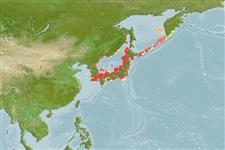| Native range | All suitable habitat | Point map | Year 2100 |

|
| This map was computer-generated and has not yet been reviewed. |
| Pleurogrammus azonus AquaMaps Data sources: GBIF OBIS |
Length at first maturity
Lm ?, range 25 - 31 cm
Human uses
Fisheries: highly commercial; aquaculture: commercial
Phylogenetic diversity index
(Ref. 82805)
PD50 = 0.7502 many relatives (e.g. carps) 0.5 - 2.0 few relatives (e.g. lungfishes)
Trophic Level
(Ref. 69278)
3.6 ±0.5 se; Based on size and trophs of closest relatives
Resilience
(Ref. 69278)
Medium, minimum population doubling time 1.4 - 4.4 years (Assuming tm=2-4)